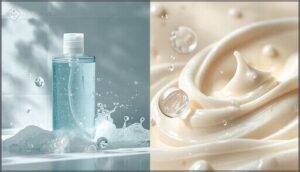This site is supported by our readers. We may earn a commission, at no cost to you, if you purchase through links.
You step into the shower and realize you’re out of body wash. Your shampoo bottle sits right there, practically calling your name. The thought crosses your mind—why not? They both clean, they both foam, and honestly, what’s the real difference?
Here’s what most people don’t realize: your scalp and your skin are fundamentally different environments, and the products designed for them reflect that biology. Shampoo’s formulation is engineered to tackle sebum and oil production on your scalp, which means it’s far more aggressive than what your skin actually needs.
While you won’t cause immediate damage using shampoo on your body once or twice, making it a habit can quietly undermine your skin’s protective barrier in ways you won’t notice until the irritation and dryness set in.
Table Of Contents
- Key Takeaways
- Can You Use Shampoo as Body Wash?
- Key Differences Between Shampoo and Body Wash
- Potential Risks of Using Shampoo on Skin
- Ingredient Comparison: Shampoo Vs. Body Wash
- Best Alternatives if You Lack Body Wash
- Expert Recommendations for Healthy Skin Care
- Frequently Asked Questions (FAQs)
- Is shampoo safe for the body?
- Are there shampoos that can be used for the body?
- Can you use shampoo to take a bath?
- Is body wash better than Shampoo?
- Can you use shampoo if you run out of body wash?
- Should you use shampoo on your skin?
- What happens if you use shampoo as a body wash?
- Can body wash be used as shampoo?
- Is shampoo a good substitute for body wash?
- Is it okay to wash your body with shampoo?
- Conclusion
Key Takeaways
- Shampoo can work as body wash in emergencies, but regular use strips your skin’s protective oils and disrupts its natural pH balance (around 5.5), leading to dryness, irritation, and a weakened moisture barrier.
- The key difference lies in formulation: shampoos use aggressive surfactants designed for oil-heavy scalps, while body washes contain gentler cleansing agents plus moisturizers like glycerin and ceramides that your body skin actually needs.
- Your skin type determines risk level—dry and sensitive skin suffers most from shampoo’s harsh effects, while oily skin tolerates occasional use better, though you’ll still miss the hydrating ingredients found in proper body wash.
- If you’re out of body wash, reach for face wash or gentle soap instead of shampoo, since these are formulated closer to your skin’s pH and won’t compromise your protective barrier as aggressively.
Can You Use Shampoo as Body Wash?
You’ve probably stood in the shower, stared at an empty body wash bottle, and wondered if shampoo could do the job.
If you’re dealing with flat, lifeless hair instead, try these techniques to add volume naturally before reaching for any product.
The short answer is yes—but it’s not that simple. Whether you can get away with it depends on how often you’re doing it, why you’re doing it, and what kind of skin you’re working with.
Occasional Vs. Regular Use
Realistically, using shampoo as body wash occasionally won’t wreck your skin. When you limit cleansing frequency, you minimize moisture loss and preserve your skin barrier.
However, regular use tells a different story:
- Increased transepidermal water loss damages skin moisture over time
- Repeated surfactant exposure elevates skin irritation risk for sensitive types
- pH level mismatches disrupt your skin’s natural defenses
- Dermatologists recommend matching products to body skin for barrier protection
Emergency Situations and Travel
Travel safety sometimes means improvising with what’s in your emergency kit. If you forgot body wash, mild shampoo can step in short-term—think one shower, not your whole trip. Choose fragrance-free formulas to reduce skin irritation risk.
Pack travel-size body wash in your first aid supplies next time, because crisis management for your skin barrier matters just as much as travel insurance for your luggage.
Suitability for Different Skin Types
Your skin type determines whether that emergency shampoo shower turns into a multi-day skincare crisis. Here’s what dermatologists want you to know about skin type considerations:
- Dry skin risks escalate fast—shampoo surfactants strip moisture your flaky skin can’t afford to lose
- Sensitive skin care demands fragrance-free formulas; most shampoos fail this test
- Oily skin tolerates occasional use better, though you’ll miss body wash’s glycerin
- Skin pH balance suffers regardless—proper skin care means matching products to your moisturizing needs
Key Differences Between Shampoo and Body Wash
You might think shampoo and body wash are basically the same thing—after all, they both clean and create that satisfying lather. But here’s the truth: these products are built differently from the ground up, and those differences matter for your skin’s health.
Let’s break down what actually separates them so you can make smarter choices for your body.
If you’re weighing manual trimmers against electric options, this guide to manual vs electric nose hair removal walks through the real pros and cons of each method.
Formulation and PH Levels
Your hair and body actually need different pH environments to stay healthy. Shampoos clock in between pH 4 and 6, matching your scalp’s acidic formulas.
Body washes usually sit closer to pH 5.5—the sweet spot where your skin barrier thrives. This pH balance matters because dermatologists know that formulas too far outside this range can compromise your skin’s natural defenses against irritation and moisture loss.
Body wash sits at pH 5.5—the sweet spot where your skin barrier thrives and defends against irritation
Ingredient selection often hinges on formulation compatibility principles, ensuring skincare products remain both effective and safe.
Surfactants and Cleansing Agents
The real star in both products is the surfactant—the cleansing agent that makes foam happen. Shampoos usually pack anionic surfactants for aggressive oil removal and micelle formation that strips sebum from your scalp.
Body wash leans on gentler amphoteric or nonionic cleansers that protect your skin barrier while still dissolving dirt. This surfactant chemistry difference explains why shampoo feels harsher on skin than dedicated cleansers. For more details on the role of surfactants in household and personal care, check out this thorough guide.
Intended Purpose for Hair Vs. Skin
Your scalp produces sebum continuously, so shampoo targets oil removal and hair shaft conditioning—key hair care basics that don’t match your body’s needs.
Body wash respects skin barrier function and pH balance importance through moisturizing surfactants. These cosmetic differences matter: shampoos strip natural oils, while body washes preserve them. Different skin types require customized dermatological effects that shampoo formulas simply don’t deliver.
Potential Risks of Using Shampoo on Skin
Your scalp and your skin aren’t the same, which means using shampoo on your body can backfire in ways you mightn’t expect.
I’ve seen patients deal with everything from mild dryness to full-blown irritation after swapping products too often. Here’s what can happen when you use shampoo as body wash regularly.
Skin Dryness and Irritation
Shampoo’s aggressive surfactants can strip your skin of protective oils, triggering dry skin causes that leave you feeling tight and flaky. You’ll notice irritation symptoms like redness or burning because shampoos lack moisturizer benefits found in body products.
Gentle cleansing tips start with understanding skin types—if yours is already dry or sensitive, shampoo disrupts skin barrier repair and worsens skin dryness, compromising overall skin health despite good skin care tips.
Allergic Reactions and Sensitivities
Your skin allergies can flare when fragrances or preservatives in shampoo trigger allergic reactions your body wasn’t designed to handle. People with sensitive skin or dermatitis often experience hives, itching, or rashes—sometimes immediately, sometimes hours later.
That’s why dermatologist recommendations emphasize hypoallergenic products for body wash over shampoo, which lacks the gentle formulation your skin actually needs for proper skin care.
Disruption of Skin’s Natural Barrier
Your skin’s natural barrier function takes a beating when shampoo’s aggressive surfactants strip away protective lipids, raising pH levels and weakening your defense against the world outside.
Here’s what barrier damage looks like:
- Increased transepidermal water loss leads to chronic dryness
- Depleted ceramides compromise lipid restoration processes
- Disrupted pH balance inhibits natural moisturizers from working properly
- Barrier repair slows, leaving skin vulnerable to irritants
- Dermatologist recommendations stress pH level-appropriate cleansers for proper skin protection
Ingredient Comparison: Shampoo Vs. Body Wash
Here’s the truth: shampoo and body wash aren’t just different bottles in your shower—they’re built with completely different ingredients for completely different jobs.
Your scalp needs oil control and deep cleansing, while your skin craves moisture and gentle care. Let’s break down what’s actually inside each product and why those differences matter for your skin’s health.
Common Ingredients and Their Effects
When you flip the bottle around, you’ll spot ingredients that sound like a chemistry exam—but they’re doing real work. Surfactants slash through oil and grime, while preservatives keep bacteria at bay. Fragrances add that fresh scent but can spark irritation in touchy skin.
| Ingredient Type | Primary Effect |
|---|---|
| Surfactants | Remove dirt and oil by breaking surface tension |
| Emollients (glycerin, oils) | Attract moisture and create a protective skin barrier |
| Preservatives | Prevent bacterial growth and extend shelf life |
Moisturizing Vs. Stripping Agents
Your cleanser’s job is either to lock moisture in or strip it away—there’s not much middle ground. Moisturizing agents like glycerin and ceramides draw water into your skin and seal gaps between cells, raising hydration and supporting barrier repair.
Meanwhile, harsh surfactants and high pH levels yank natural oils off your surface, leaving you tight and dry.
| Agent Type | Effect on Your Skin |
|---|---|
| Humectants (glycerin, hyaluronic acid) | Pull water into outer layers and keep the stratum corneum plump |
| Emollients (ceramides, fatty acids) | Fill gaps between cells and reduce water loss |
| Occlusives (petrolatum, dimethicone) | Create a physical seal that slows moisture evaporation |
| Strong Anionic Surfactants (SLS/SLES) | Disrupt lipid barriers and increase transepidermal water loss |
| High pH Cleansing Agents | Denature proteins and compromise moisture balance |
Absence of Skin-Specific Ingredients in Shampoo
You’ll notice that shampoo formulations skip most ingredients your body skin actually needs. Manufacturers prioritize for hair cleaning, so moisturizers like glycerin, barrier-building ceramides, and soothing botanicals rarely make the cut.
Without these, shampoo can’t defend against barrier disruption or moisturizer deficit, leaving skin exposed to surfactant effects that body wash formulas are designed to counter.
| Ingredient Type | Body Wash | Shampoo |
|---|---|---|
| Glycerin & Hyaluronic Acid | Standard for hydration | Often omitted |
| Ceramides & Cholesterol | Support barrier repair | Rarely included |
| Panthenol & Allantoin | Calm and soothe skin | Skipped for hair focus |
Best Alternatives if You Lack Body Wash
So you’re in a pinch without body wash—what should you reach for instead? The good news is you’ve got better options than shampoo sitting right in your bathroom or kitchen.
Let’s talk about what actually works when you need a safe alternative.
Using Face Wash or Gentle Soap
When you’re fresh out of body wash, reach for your face wash or a gentle soap alternative instead of shampoo. These options are formulated with your skin’s pH in mind—usually around 5.0 to 5.5—and include humectants like glycerin to keep moisture locked in.
Face Wash Tips for daily skincare:
- Choose fragrance-free formulas to minimize irritation and allergic reactions
- Look for milder surfactants like decyl glucoside rather than harsh foaming agents
- Creamy or gel cleansers work best for dry or sensitive skin types
- Rinse thoroughly and follow with a moisturizer to support your skin’s natural barrier
- Avoid alkaline soaps that disrupt your acid mantle and strip protective oils
DIY Body Wash Options
If you prefer control over every ingredient that touches your skin, homemade recipes built on natural ingredients like Castile soap let you craft gentle cleansers suited to your skin types. Mix one part Castile with three parts water, add 3 to 5 percent glycerin for hydration, and finish with a few drops of jojoba oil—then test the pH with strips to confirm it’s between 5.0 and 6.5.
| Base Ingredient | Skin Benefit |
|---|---|
| Castile soap + water | Mild cleansing without stripping |
| Glycerin (3-5%) | Locks in moisture effectively |
| Aloe vera gel (2-5%) | Soothes irritation and redness |
Considerations for Sensitive Skin
Sensitivity requires vigilance—your skin barrier can’t afford gambles with harsh surfactants lurking in shampoo as body wash formulas. Stick to products labeled fragrance-free and hypoallergenic to support gentle cleansing while respecting pH level needs and skin and hair differences.
Patch test anything new, minimize the product lineup to dodge irritant avoidance pitfalls, and follow with moisturizing needs your dermatologist would approve for complete hair and skin care protection.
Expert Recommendations for Healthy Skin Care
Here’s the bottom line: your skin deserves products designed specifically for it.
As a dermatologist, I’ve seen too many people damage their skin barrier by treating body care as an afterthought. Let me share the key principles that’ll keep your skin healthy and resilient.
Dermatologist Advice on Product Use
Here’s my hair care advice: stick to products designed for their intended purpose. Your skin deserves body wash formulated at the right pH level for gentle cleansing, not something meant for your scalp.
If you’re traveling and forgot body wash, use shampoo sparingly—but don’t make it a habit. For dermatologist insights on product safety and healthy skin habits, remember that proper cleansing starts with the right cleanser.
Tips for Preventing Skin Issues
Consistently, the best skin care starts with gentle cleansing twice daily using lukewarm water—hot showers strip your natural oils. Pat dry with a soft towel, then apply a fragrance-free moisturizer within three minutes to lock in skin hydration.
Don’t forget sun protection: broad-spectrum SPF 30 every morning prevents UV damage. Understanding body wash vs shampoo formulations matters for personal hygiene and maintaining hair and skin health through proper exfoliation techniques.
Frequently Asked Questions (FAQs)
Is shampoo safe for the body?
Shampoo won’t poison you, but it’s like using dish soap on your face—overkill.
Occasional body use is generally safe, though surfactant effects can disrupt skin pH balance and strip natural oils more aggressively than body wash.
Are there shampoos that can be used for the body?
Yes, 2-in-1 or 3-in-1 products are formulated for both hair and body skin. These gentle formulas balance pH for skin compatibility, making them safer shampoo alternatives than standard hair cleansers when body wash isn’t available.
Can you use shampoo to take a bath?
You can, but your skin mightn’t thank you.
Shampoo pH levels run higher than what skin prefers, and it strips moisture faster than body wash, leaving you dry after bathing.
Is body wash better than Shampoo?
For your body, absolutely—body wash offers better pH balance importance and moisturizing effects than shampoo.
The cleansing agents in body wash protect your skin’s natural barrier instead of stripping it away.
Can you use shampoo if you run out of body wash?
If you’re out of product substitution options, you can reach for shampoo as a body wash substitute—but only for emergency hygiene situations.
Mild, fragrance-free formulas work best to maintain skin pH balance.
Should you use shampoo on your skin?
Just because you can doesn’t mean you should. While shampoo won’t harm you occasionally, its stronger cleansing agents disrupt skin pH balance and strip natural oils, compromising your skin barrier and moisture levels long-term.
What happens if you use shampoo as a body wash?
Using shampoo as body wash strips natural oils with stronger cleansing agents designed for scalp comparison, not body acidity.
This disrupts skin pH balance, triggers moisture loss, and creates irritation factors—especially on sensitive areas needing gentler care.
Can body wash be used as shampoo?
In a pinch, yes—body wash can clean hair, but it strips scalp oils and lacks hair-specific conditioners.
Your hair type and scalp sensitivity matter; product swapping works short-term, not long-term.
Is shampoo a good substitute for body wash?
Not for daily routine. Shampoo’s pH and surfactant effects can disrupt body skin needs and skin pH balance, stripping protective oils.
Hair care differences matter—gentle cleansing options designed for skin are always better.
Is it okay to wash your body with shampoo?
It’s acceptable once in a while, but shampoo strips your skin’s natural oils more than body wash.
Frequent use can leave a residue feeling and trigger dryness, especially if you don’t choose a mild formula.
Conclusion
Your skin isn’t a forgiving surface—it remembers every shortcut you take. While you can use shampoo as body wash in a pinch, treating it like a permanent swap is asking for trouble your moisture barrier won’t forgive.
Stick to products designed for skin, not scalp. Your dermatologist isn’t being precious about this; we’re simply acknowledging that your body deserves formulations built for its unique chemistry, not borrowed solutions from the shower shelf above.











